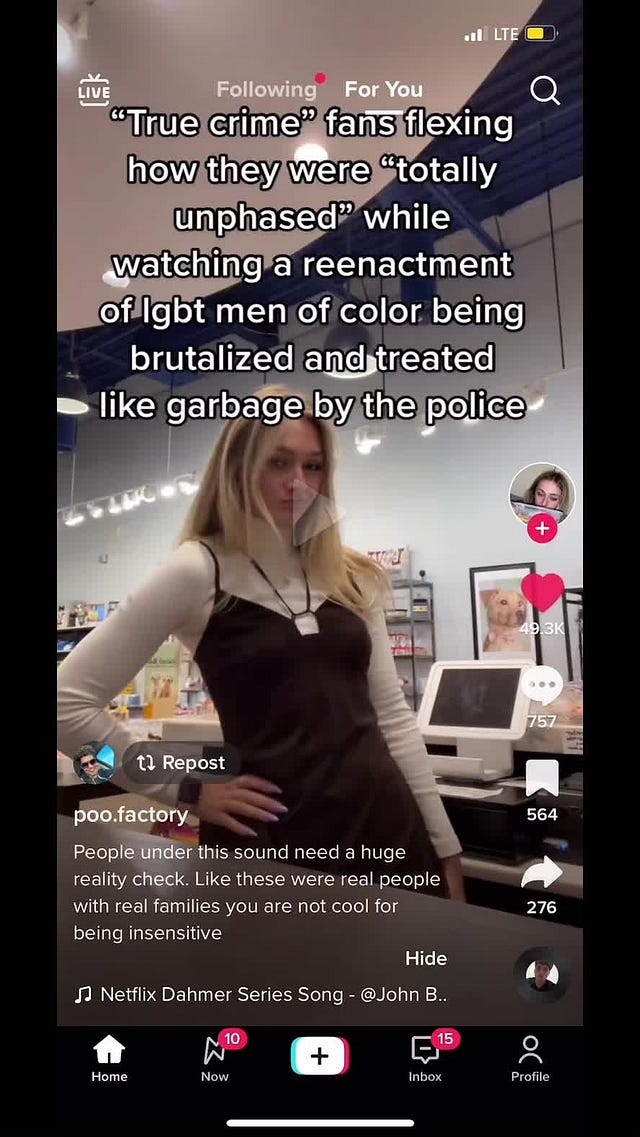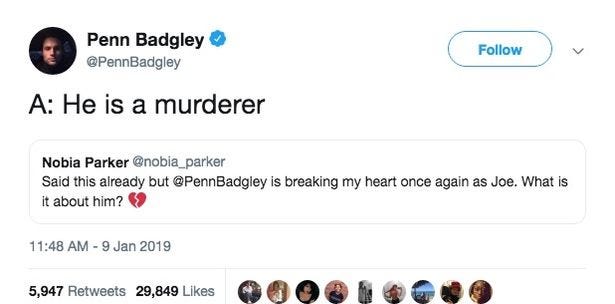You're Not Supposed To Want This
Netflix, True Crime and You
If asked to name my circles of internet hell, True Crime and its fanatics would be among the top 5. There are only so many times I needed to stumble across a makeup tutorial x True Crime story when I was 17 to know that the way we talk about the real-life harm caused to people feels incredibly voyeuristic and detached from any semblance of remorse.
Our cultural obsession with bloodlust and solving crimes has long been a staple of our media. Think of all the late-night (now daytime) channels on TV dedicated to reenacting True Crime through docuseries and documentaries. Today, True Crime tends to be most popular on streaming services thanks to the boom of the Netflix docuseries (Hulu, HBO and more also contribute). In 2015, Making a Murderer was a pivitoal moment for Netflix seeing as it hit 19.3 million viewers 35 days after its debut.1 According to Parrot Analytics, True Crime is one of the most in demand documentary subgenres.2 However, this obsession continues beyond documentaries. When you log in online, suddenly you’re bombarded with podcasts3, TV recreation of serial killers, Tumblr blogs, fancams and edits. You name it, it exists, and it comes with a barrage of fans ready to die to defend their right to consume it.
A clear example of the obsession over the True Crime genre can be found in the inescapable presence of Dahmer. Produced under Ryan Murphy’s $300 million deal with the streaming service, he gave Netflix their second most-watched series. When I say Dahmer was everywhere, I mean it was EVERYWHERE. Beyond the memes that took moments of Dahmer brutalising and terrorising people into humorous gags, there were videos of people sexualising Dahmer, people feeling bad for him, costumes over Halloween weekend, and most recently, both Evan Peters and Niecy Nash have won for their portrayals of Jeffery Dahmer and Glenda Cleveland this awards season.
 Tiktok failed to load.
Tiktok failed to load.Enable 3rd party cookies or use another browser
 Tiktok failed to load.
Tiktok failed to load.Enable 3rd party cookies or use another browser
Suppose somehow you managed to ignore Dahmer and its relentless discourse. In that case, you may wonder why this show would become so popular, as it seems we’ve entered a period where celebrating this re-enactment feels incredibly crass. However, this has always been part of Murphy’s charm beyond Glee. Think of Tate from American Horror Story (also played by Evan Peters) as well as the constant borrowing from True Crime for the show. Not to mention Murphy’s most clear move into the genre with American Crime Story.
However, both shows are about as respectful to the victims and their lives as you'd expect from watching a True Crime Youtuber discussing old casefiles whilst doing a mukbang. As expected, Dahmer has received mass backlash for the show refusing to contact the victim’s families for their permission and romanticising the killer.
And funnily enough, one of the voices criticising Netflix (and by proxy Murphy) is star of You, Penn Badgley. If you’re unaware of who Badgley is, he’s of Gossip Girl fame (also, in Easy A and John Tucker Must Die), but most importantly he stars as Joe Goldberg in one of Netflix’s most popular shows.
During an interview with Entertainment Tonight, he was asked about the serial killer phenomenon and stated,
“You need to look at that, inside. Now to be fair, with our show, you’re meant to fall in love with him. That’s on us. Ted Bundy, that’s on you. Jeffrey Dahmer, that is on, that is on Netflix. That is squarely on the shoulders of Netflix.”
Badgely has always maintained that he doesn’t understand the obsession with serial killers, especially Joe. To him, it’s evident that the character is cruel and unfair to those around him, not to mention his need to stalk, kidnap and murder people (especially his romantic partners). Badgely argues that You is about privilege and how far we’ll take it to understand the plight of a white man.
When speaking to the New York Times, he had this to say,
“To me, Joe is this work in progress in dismantling and dissecting the myriad of privileges that a young, attractive, white man carries with him.”
The show’s intent is clear when you listen to Badgley and the show’s creator Sera Gambles explain what was originally intended. When asked about the show’s messaging Gambles stated that we as a society are hard-wired to root for a love story and forgive men whilst judging women. That’s something I agree with but when you actually watch You, that intent seems to vanish. It's a show that's 80-90% narrated by a man who explains what he did out of a need for love, having been abused and orphaned. There is rarely a moment where the show truly challenges him, and instead, confirms that the women in his life are indeed the problem he views them to be.
As Siyyan Inaas writes in her essay on the female characters in You,4
“However, we do spend some time outside of his head. If this show’s intention also is to comment on Joe’s unhealthy view of women, and his toxic masculinity — why is it that when we leave his point of view nothing changes? If he’s putting these women in boxes that he created to satisfy his narrative, in Season 1 Episode 4 when we spend time in Beck’s point of view, why don’t we see differences in the way she acts or Peach? “
A prime example is when Joe kills Love, his main romantic interest in seasons 2 and 3. When Love was revealed to have murderous tendencies similar to Joe, some of the audience responded that she was irritating, even though she reflected Joe's crimes. As Joe kills Love, it is depicted as him saving the world from her wrath. It glorifies Joe’s POV to satisfy the audience's bloodlust of “yes, he was right to kill her because she was a total bitch.” The only woman (girl) safe from Joe is Ellie, and that’s because Joe has projected onto her in the same way he did with Paco. The difference here is his care for Ellie is most likely conditional. The second Ellie becomes an adult and presents in a way that he deems unfit, she would be taken down as Beck, Peach, or Love would.
So how does this relate to Dahmer? I think it’s fascinating that we can have such cognitive dissonance to wonder why Netflix would make a show like Dahmer whilst already profiting off shows that engage in similar narratives of romanticisation for serial killers. And this is where must state that I understand that Dahmer was a real person, and Joe is not. There’s no argument that he has caused actual harm to real-life victims like Dahmer or Bundy, but the reactions to his character are eerily similar. When we speak about understanding how media impacts how we interact with one another and the world, surely we can see that the romanticisation of one often flows into the other?
Pretending like You is some grand thesis on masculinity feels like a way to peddle the show without garnering criticism. Not only that but, it seems that Badgley’s own interpretation of the character has shifted. When speaking in conversation with actress Ayo Edebiri, he tells her,
“He [Joe] certainly wouldn’t describe himself as a serial killer. I don’t play him like a serial killer, and I don’t think of him as one.”
But what does one call someone who murders people consistently? An accidental killer? A sleepwalking killer? Joe is temperamental and idiotic at times, but he is methodical. He stalks, keeps a lair to kidnap his victims, and buries bodies where nobody will find them. If the show's goal was to make us question why we afford them such leeway and adopt them into our pop culture lexicon, then why hasn’t the conversation around the show changed in the past 4 years?
Each time a new season of You emerges, we have a wave of memes subtly agreeing with his actions, recreating his internal dialogue or downplaying the harm he inflicts on the people in his show. The quintessential internet culture aspect of this are the fancams people make of Joe. These include clips of him from the show in a slowed-down manner with sexy music in the background, removing all context of the character's actions. Of course, this phenomenon isn't new—think of Kylo Ren or even Loki, both villainous and deemed somewhat sexy (to the general public). Still, neither actor is giving us grand speeches about how Dahmer is bad whilst aiding in a kidnap fantasy with Drew Barrymore.
Yep, you read that correctly. Drew Barrymore's team built a replica of the kidnapping box Joe uses to hold his victims. After Barrymore is led blindfolded into the box, Penn emerges seductively and walks up to Barrymore, exclaiming, “You’re not supposed to want this.”
I can’t help but grimace at this video. Is this not the exact opposite of what both Netflix and Badgley have been exclaiming for years? A show that aims to examine why male serial killers are allowed to get away with so much should not be engaging in fanfare to this degree. I think of the image attached to this piece where Netflix attempts to separate Penn and Joe, and of course, they are two separate people, one being real and the other fictional. But when you’ve capitalised on the memes, made quirky Tiktoks about Joe’s commute in London or cutesy Valentine’s day posts, what other outcome do you expect?
Like Dahmer, You fulfils a fantasy for the viewer. Here is a man that the viewer finds attractive committing a heinous act. They aren't thinking about why they find this fascinating but instead revel in the excitement of watching something out of the norm. Neither show utilises a narrative that attempts to question our obsessive nature. In fact, one of the few movies and shows I can think of that do this well are Fincher's Zodiac and Mindhunter. As stated in the Tweets below, I can’t say that either is perfect, but there seems to be an examination of our cultural need to watch people suffer perpetually that is missing from both Dahmer and You.
There is no doubt that You and other shows, books, and movies like it will continue to be popular, but at the very least, would you please spare us the lecture while you continue to promote the media circus that follows?
https://www.businessinsider.com/netflix-making-a-murderer-ratings-2016-2?r=US&IR=T#:~:text=After%20its%20first%20week%2C%20the,million%20viewers%20watched%20the%20series.
https://www.parrotanalytics.com/press/documentaries-become-fastest-growing-streaming-genre-2/
https://variety.com/2020/digital/news/new-york-times-buys-serial-this-american-life-1234713946/










I am still reading but I read through the Drew Barrymore part screaming, “Get her, Jade!”
true crime fans have an ounce of empathy challenge
loved this!